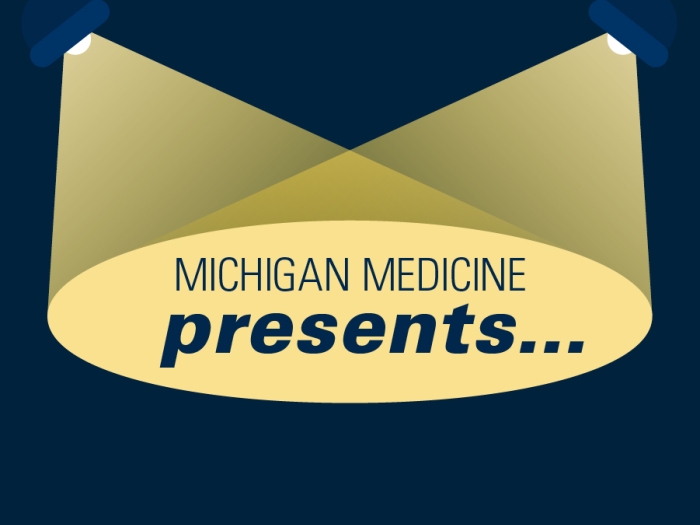A student who’d been helped stepped up along with faculty members to pay it forward.
9:25 AM
Author |

Rachel O'Reggio knows what it is to struggle as a medical student. Academic challenges hit the University of Michigan Medical School student hard her first year, and she took a leave of absence from school in early 2020.
She also knows what it is to struggle through compounding challenges as a student on leave.
Without qualifying credit hours, she lost access to financial aid. Since she'd been consumed with medical school, she didn't have another source of income. And because she was older than 26, she couldn't be on her parents' health insurance.
O'Reggio found a lifeline in a mentor. Michael Englesbe, M.D., a transplant surgeon who is heavily involved in medical student education, offered her a research position, which helped her stay afloat while she reset and completed requirements to continue medical school.
While working in the research role, O'Reggio thrived in other realms. She published articles, worked for the Biden campaign on COVID relief efforts, and spearheaded the University of Michigan/Black Medical Association silent protest as President of the Black Medical Association.
"It was a horror story, but now it's a beautiful story. I was struggling. They were able to supply that position for me, and I was able to succeed and pass the exams I had to retake," O'Reggio says.
COVID soon hit, and more students were in the same leaky boat: Several classmates took time off for mental health or family reasons. Some who stayed on struggled financially, as their families weathered their own financial difficulties.
Forget the avocado toast generation trope. Rice and beans for every meal or even skipped meals was the reality for some students. Others were sending their financial aid to their families—an occurrence more common among underrepresented minorities—so they had even less cushion when crises hit.
Englesbe saw evidence of those harsh struggles firsthand.
"A student I knew well was getting skinnier before my eyes, and I assumed it was anxiety. It was devastating poverty. I was so naïve about how little a financial cushion some of our medical students have. COVID really exposed this," Englesbe says.
According to O'Reggio, Englesbe urged her to help him do something. That something became the Shield Fund, a program intended to bridge funding gaps for medical students in financial need.
A tumbleweed of needs and an avalanche of giving
One of Englesbe's first contacts to get the Shield Fund going was Gifty Kwakye, M.D., a colorectal surgeon and the director of the surgery clerkship.
Kwakye, who is originally from Ghana, says she tended to mentor students who were of underrepresented minorities. Englesbe asked if she'd been hearing about any specific hardship stories. Kwakye was already aware of the challenges some of the students she mentored were facing, but not how taking leaves exacerbated them.
"A lot of them were struggling when it came to academic performance. Some of my students were going homeless, and people were sleeping in their cars. It was spiraling, and then COVID happened. We heard students were using part of their financial aid resources to support their families," Kwakye says.
Kwakye's reaction was sadness and anger. She channeled that anger into action by joining Englesbe and another surgery faculty member, Gurjit Sandhu, Ph.D., associate professor of Surgery & Learning Health Sciences and the vice chair of Resident Professional Development on the nascent board for the Shield Fund.
O'Reggio was named the student chair of the board and was joined by other students: Fourth year medical students Natalie Moreno and Gracia Vargas, third year medical student Erica Odukoya and second year medical student Donovan Inniss. Laura Boudette, director of Development for Michigan Medicine, Medical Education and the Institute for Healthcare Policy and Innovation, and Tedi Engler, director of Strategic Initiatives in the Department of Surgery, also joined the board.
The next step was to generate funds, and the team started close to home.
Englesbe circulated an email primarily to surgery faculty, staff and house officers outlining the challenges students were facing and suggested donation amounts based on position. The response surprised even the most optimistic board members.
Like Podcasts? Add the Michigan Medicine News Break on iTunes, Google Podcast or anywhere you listen to podcasts.
"We underestimated the generosity of our community. We hit $12,000 without even trying in our initial fundraising efforts with one email," Engler says.
The goal was $10,000. While exceeding expectations is a good problem to have, the group realized a formal entity was needed to pass the money through, so Engler helped establish a 501(c)(3) for it.
At the same time, a process was developed for receiving and fulfilling requests for aid: Students fill out a form with their contact information, leave status, a request amount and specific information about the need. The information is de-identified before being presented to the board for consideration.
Decisions are made using a rubric of factors to score the need: Whether it's urgent and whether a student's need might be met by other sources they may not have pursued, for example.
"Whatever your need is, it is important to us. If you identify it as a need and it's important for your wellness, education and your ability to exist in the world, it's important to us," Odukoya says.
What the needs look like
COVID has been a great disrupter and spotlighter. At the same time the virus sickened and killed so many, it exposed disparities in health care and in access to resources. That was true among medical students as well.
The needs became more acute, and they weren't all related to students being on leave. The board saw two buckets of requests: Those related to basic life necessities—rent, car repairs, health care—and those related to educational resources—study aids, books and access to test prep websites.
Odukoya was struck by the modesty of the requests, and the humility it took to make them. She sensed that students were cognizant of not wanting to take from their peers.
"They're all very specific, and you get a sense the student has calculated it. The narrative comments are all extremely sincere and authentic. They read with gratitude, with explicit need, that this is something they've tried other avenues for and with a sense of feeling sad they have to ask for this," Odukoya says.
Evaluating requests can be tricky. What may seem frivolous at first isn't when you reflect on the circumstances leading to the ask.
O'Reggio cites an example of requesting funds for a desk. Frivolous? Not when you realize that students who would otherwise have worked from the library or other spaces could no longer do so due to COVID.
So far, the fund has distributed about half of the $12,000 initially raised.
Lessons learned, and an evolving program
The team learned that distributing funds to students could have unintended consequences with regard to their federal financial aid. To avoid that, the team has started paying vendors when applicable for certain services students need funded.
Some needs were met through savvy solutions.
Englesbe received help from the medical school curriculum team to develop a longitudinal course called Capstone for Excellence. Students can enroll in the course and make progress towards graduation as an alternative to a leave of absence, and thus retain eligibility for financial aid and loans.
Fielding requests sometimes means playing matchmaker with other funds and sources of support. The request form was recently changed to ask whether other avenues have been pursued, and, if a request is compatible with another resource, students are directed to it.
MORE FROM THE LAB: Subscribe to our weekly newsletter
"The Student Diversity Council raised money for wellness mini grants. If you apply to the Shield Fund and say you want a wellness lamp, we'll tell you that you should apply to this fund instead. If you say you need $8,000 because you're taking a year off and need to cover expenses, we can tell you that we have this Capstone for Excellence course, and we'll direct you to financial aid. We need to make our reserve as robust as possible," Odukoya says.
Englesbe is proud of the progress the fund has made, and how it's assisted students. He'd also like to see it disappear, along with the need that drives it.
"I hope that we go out of business. Medical school is hard enough, especially for students who come from backgrounds underrepresented in medicine. We need to fix the systems that make this such a problem," Englesbe says.
O'Reggio is hopeful the fund will help students excel in ways behind the academic by relieving financial stress. Like her, perhaps they'll find other avenues to explore and new ways to thrive.
As for personal lessons, she has gained insights that she says will serve her as a physician.
"How do you make people feel comfortable and give them the space and opportunity to voice their inner concerns and address their needs? We might be disappointed patients don't fill their prescriptions. Maybe they're not being non-compliant. Maybe they don't have money or transportation," O'Reggio says.
For Odukoya, approaching her peers in the spirit of service and gratitude intended for patients has given them more than just a check. It's changed their trajectory.
"This provides not just financial support but hope. When students are in a destitute state, they tend to be hopeless, and they tend to not be able to be their best selves."

Explore a variety of healthcare news & stories by visiting the Health Lab home page for more articles.

Department of Communication at Michigan Medicine
Want top health & research news weekly? Sign up for Health Lab’s newsletters today!





